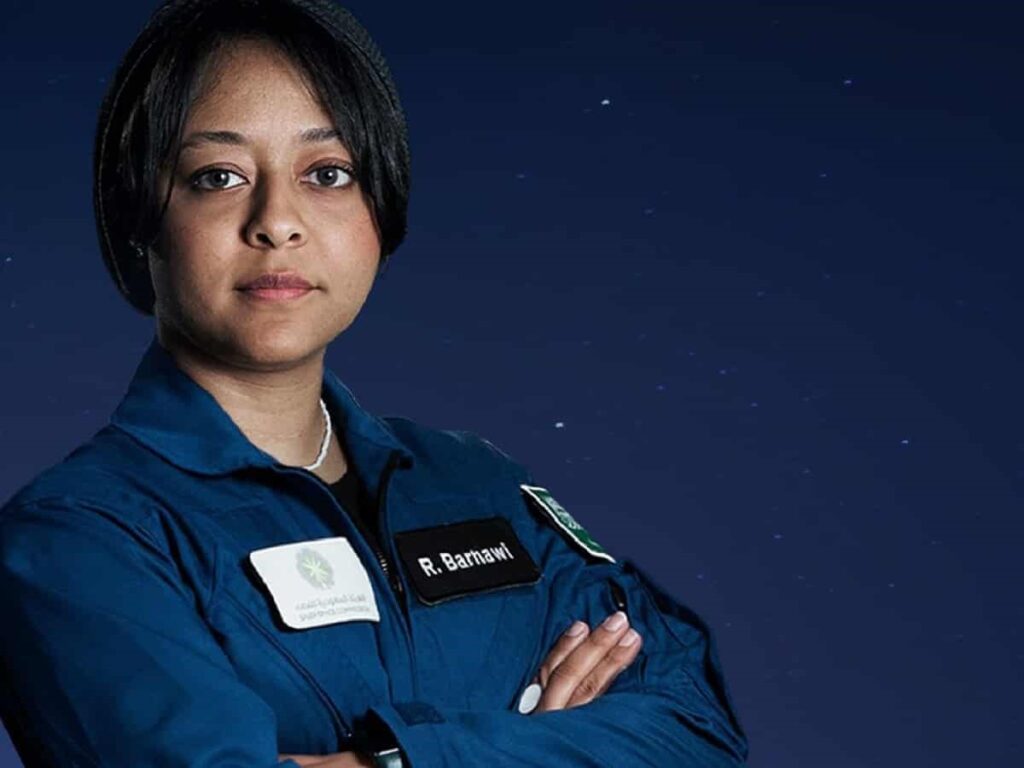Breaking Barriers: Saudi Arabia to Send First Female Astronaut to Space This Year!

Later this year, Saudi Arabia will send its first female astronaut to space, making history. According to the official Saudi Press Agency, Rayyana Barnawi will accompany Ali Al-Qarni on a 10-day expedition to the International Space Station (ISS) (SPA). As a part of a mission by the commercial space business Axiom Space, they will go to the ISS in a SpaceX Dragon spaceship. Along with Tennessee businessman John Shoffner, who will be the pilot, Peggy Whitson, a former NASA astronaut, will be a member of the crew on this, their fourth trip to the ISS.
A SpaceX Falcon 9 rocket will lift the astronauts into space from Launch Complex 39A at NASA’s Kennedy Space Center in Florida. After the United Arab Emirates launched its first astronaut to the International Space Station in 2019, Saudi Arabia is now the second Arab nation to send a citizen into space.
As part of his efforts to shift the conservative perception of the country, Saudi Arabia’s Crown Prince Mohammed bin Salman has made a number of reforms. Without a male guardian, women can now drive and travel overseas. Saudi Arabia established its space programme in 2018 and, as part of Crown Prince Salman’s Vision 2030 plan for economic diversification, announced a second programme to send astronauts into space in 2022.
This is not Saudi Arabia’s first venture into space. The first Arab Muslim to travel into space was Saudi royal Prince Sultan bin Salman bin Abdulaziz in 1985 as a participant in a US-led space project.
The Saudi Space Commission chose Rayyana Barnawi, a Saudi scientist, from a group of applicants in 2019 to be one of the country’s first female astronauts. Barnawi claimed in an interview with Arab News in 2020 that her father, an engineer, served as an inspiration and constantly pushed her to follow her goals.
“I think it’s a message that space and STEM fields are for everyone,” she said. “It doesn’t matter what your gender is, what your nationality is, what your religion is. It’s a place for everyone to explore and to learn and to contribute.”
A researcher at the King Abdullah University of Science and Technology, Barnawi has a PhD in computer science from the University of Colorado. She belongs to the Women in Aerospace Middle East (WAME) organisation.
This space mission will mark a significant turning point not only for Saudi Arabia but also for Middle Eastern women. It conveys the strong message that gender is not a barrier to success in any subject, including STEM, and that women can accomplish everything they set their minds to.
The Saudi space programme is a part of the nation’s overall strategy to diversify its economy away from oil and to advance its technological and scientific prowess. The government wants to develop a domestic space economy that includes satellite production, space exploration, and participation in global space initiatives.
This space mission is a critical turning point for Saudi Arabia, which has made considerable strides in expanding its space sector in recent years. It shows that the monarchy is committed to advancing its science and technology capabilities and is making investments in the future.
The mission is anticipated to occur later this year, and observers from all across the world will definitely be paying close attention. The Saudi Arabian space programme will be crucial in spurring innovation, generating jobs, and instilling the next generation of scientists and businesspeople as the country continues its road towards economic diversification.
